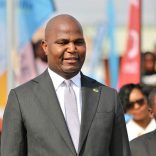Mozambique: Fight against terrorism “remains top priority”
“Do not expect PR visits to result in suspensions” – Nyusi says state-owned companies are next

O País
President Nyusi says he visits ministries because it is his duty to investigate work on the ground.
Since he began visits to government ministries, President Nyusi has toured more than a dozen institutions. From the outside, the effectiveness of the initiative, which often exposes long-standing structural problems, is being questioned. There are also those who understand that the initiative has a strong potential to create “scapegoats” in state institutions. Despite these and other critical interpellations, the head of state does not seem to have any plans to back down.
Yesterday, President Nyusi went to the Veterans Affairs Ministry and announced that, in the future, he will be visiting state-owned enterprises too.
“It is customary to hear that the president has already visited the first, second and third ministries and has encountered the same problems. He will not find new things. I do not need to find new things, because the ministries are different. It is my duty to keep up with the work on the ground, it is the style of work I have chosen,” the president says.
A style of “collective governance”, he says, warning critics not to expect the visits to end with the suspension of leaders. “It is more productive and valuable if a visit ends with some indication of what is wrong and how it has to be done, but also by praising what is being done right,” he said.
Also Read: Nyusi criticises top-heavy Science Ministry – AIM
And one of the things being done well in the Veterans Affairs Ministry is the registration of veterans and demobilised combatants. From 2015 to this part, 52,169 combatants were registered, including 37,910 veterans of the struggle for independence and 16,236 demobilised soldiers. In the same period, 14 410 identification cards were issued.
“The great effort they have made for the registration of the fighters of the two generations is felt on the ground. I said at the beginning of this cycle of governance that I found it strange that in 31 years of the pension process we have not been able to register all the combatants. Just now, we have surveyed 27 million Mozambicans in 15 days.” The head of state also praised the good relationship between the ministry and the combatants, recalling that “six or seven years ago”, the Veterans Affairs Ministry was a nexus for demonstrations.
Also Read: Nyusi visits health sector to assess performance
Also Read: New competencies for two ministries – Nyusi
Praise aside, Filipe Nyusi demanded more openness and inclusion in the ministry. In fact, he said that he wants to see the ministry as a home for all combatants and Mozambicans. “We want your ministry to help the younger generations not be afraid of the combatant. The combatant must be spoken to as ‘Tu’ as a sign of greater rapprochement between him and society. We want Mozambicans to be proud of the combatants,” he said.
Like many other state institutions, the Veterans Affairs Ministry also records cases of people who illegally benefit from the rights and privileges of combatants. The National Directorate of Social Assistance has identified 35 fake combatants but learned none of them ever received a pension though many benefited from the special rate stipulated for fighters on the flagship airline, LAM.
Also Read: Peace Fund should not depend entirely on state
Prioritising collective memory
“Why is it that in some of the young there is this idea that the role of the combatant is over, is dispensable,” the head of state asked the director of the National Liberation Struggle History Research Centre. “This results from the low impact of the work which we, as researchers, do with youth, in coordination with institutions dealing with young people,” Carlos Lwanga replied.
In response, the president advocated greater emphasis on the work done by the centre in publications that inform the collective memory. And he warned: “We are getting to a stage where individual reports are pretty rigged, in some cases. And so it is in history. After some time, there is a tendency to appropriate data as if it were individual.”












Leave a Reply
Be the First to Comment!
You must be logged in to post a comment.
You must be logged in to post a comment.